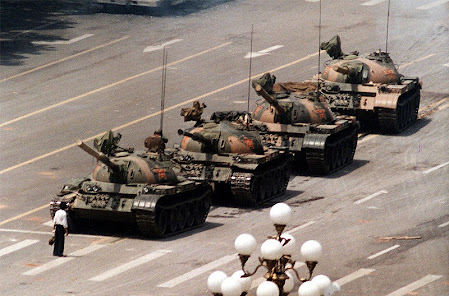 |
| Tiananmen Square in 1989 |
From Reuters (Jessie Pang and Ben Blanchard):
Hong Kong police searched and detained scores of people on Sunday, four arrested for "seditious" intent, as authorities tightened security for the 34th anniversary of the 1989 Tiananmen Square crackdown.
Restrictions in Hong Kong have stifled what were once the biggest vigils marking the bloody crackdown by Chinese troops on pro-democracy demonstrators, leaving cities like Taipei, London, New York and Berlin to keep alive the memory on the June 4 anniversary...
Hong Kong activists say such police action is part of a broad campaign by China to crush dissent in the city that was promised continued freedoms for 50 years under a "one country, two systems" formula when former colonial power Britain handed it back in 1997.
Security is significantly tighter across Hong Kong this year, with up to 6,000 police deployed, including riot and anti-terrorism officers, according to local media.
Senior officials have warned people to abide by the law, but have refused to clarify if such commemoration activities are illegal under a national security law China imposed on Hong Kong in 2020 after mass pro-democracy protests...
Despite the warnings in Hong Kong, some individuals including some book shop owners, have been quietly marking June 4.
Jailed Hong Kong activist Chow Hang-tung, one of the leaders of a group called The Alliance, which used to organise Hong Kong's annual June 4 vigils before it was disbanded in 2021, said on Facebook she would hold a 34-hour hunger strike.
In mainland China, any mention of the Tiananmen Square crackdown - where troops opened fire on pro-democracy protesters, killing hundreds if not thousands, according to rights groups - is taboo and the subject is heavily censored.
China is, by the by, an absolute mess (Article is from Bloomberg but it's firewalled, so you get Yahoo! instead):
Hegang, a city with nearly a million people near the Russian border, had debt of more than double its fiscal income when it hit the headlines almost 18 months ago. It was the first time a city administration had taken official emergency steps since the State Council unveiled rules in 2016 on how local governments, from counties to provinces, should deal with debt risks.
Hegang’s residents are now feeling the brunt of the fiscal clampdown. During a recent visit to the city, locals complained about a lack of indoor heating in freezing winter temperatures, and taxi drivers said they were being slapped with more traffic fines. Public school teachers worried about rumored job cuts, and street cleaners endured two-month delays to their salaries...
Hegang represents just the tip of the iceberg of a local government debt problem that’s making investors increasingly nervous and that threatens to be a drag on the world’s second-largest economy for years to come. Goldman Sachs Group Inc. estimates China’s total government debt is about $23 trillion, a figure that includes the hidden borrowing of thousands of financing companies set up by provinces and cities.
While the chance of a municipal default in China is relatively low given Beijing’s implicit guarantee on the debt, the bigger worry is that local governments will have to make painful spending cuts or divert money away from growth-boosting projects to continue repaying their debt. At stake for Xi is his ambition of doubling income levels by 2035 while reducing the gap between rich and poor, which is key for social stability as he seeks to rule the Communist Party for potentially the next decade or more.
“Many cities will become like Hegang in a few years’ time,” said Houze Song, an economist at US think tank MacroPolo, noting that China’s aging and shrinking population means many cities don’t have the workforce to sustain faster economic growth and tax revenue.
“The central government may be able to keep things stable in the short term by asking banks to roll over local governments’ debt,” Song said. Without loan extensions, he added, “the reality is that over two thirds of the localities won’t be able to repay their debt on time.”
There had been a massive construction boom going on across China in the past two decades, as though the central government was using all of that to overcharge their economic numbers to look better than they were. Stories abound about entire cities built without residents and massive construction projects that sit unused because there was no actual demand for them. Most of these "ghost towns" look to be owned as commodities rather than residences, creating the kind of economic bubble that led to the 2007-08 housing market crash that created the Great Recession.
If China is heading down that path, how soon will their investments and financial stability collapse to where it affects their manufacturing and exporting? At what point does the economic disparity between the vast poor and the elite (party leadership) rich become another protest?
How soon before Tank Man's children rise up, Xi?

No comments:
Post a Comment